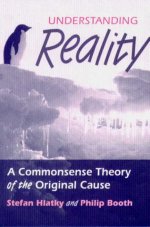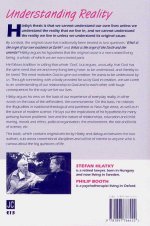 |
 |
The On-line Book
![]()
The entire book is available here on-line. Introduction Booth Chapter 1: Understanding
reality: a basic human need Booth Chapter 2: Dialogues Hlatky and
Booth Dialogue 1: Existence, activity and the original cause
Dialogue 2: Consciousness and identity
Dialogue 3: Objects, subjects and love
Dialogue 4: Philosophical logic and its basis: the self-evident
Chapter 3: The organic view of
unity Hlatky
Chapter 4: Are we alike or
unlike? Hlatky
Chapter 5: Science, religion and philosophy Hlatky Chapters 3 and 4 in Swedish can be found at http://hem1.passagen.se/lanor Chapter 5 in its original German can be found in the articles section of this web site
The Being and
consciousness; concrete vs abstract, existence vs activity;
science - inner and outer; theology and pantheism: abstract
original causes; can God be understood?; Hlatky's view of
God, the Being and creation; differences from theology; the
whole and its parts; theology and philosophy; the need for
mutual love; science and the old traditions; the Big Bang
and the problem of the original cause; science and 'why?';
modern science and philosophy; time
The philosophical
education of children; the mystical 'I'; 'free' will; human
will and Nature's will; the problem of identity; our
absolute identity and our 'relative identity'; animals'
undivided love of life; unlimited consciousness; is the
universe alive? 'life' and 'death' vs conscious and
non-conscious; God's activity and the activity of the
conscious parts; the need of consciousness: undivided love;
the necessity for agreement; 'freedom' from
reality?
Can love be
one-sided?; can we love an object?; love and preference;
helping and understanding; whom can we have exchange with?
the bondage of love; identity; the parts of the Being;
consciousness and creation; God-consciousness; God: the
original object, including his parts; object/quantity and
quality,; the quantity and quality of consciousness; science
and consciousness; the need to understand and to be
understood; animals, love and understanding; love or power;
use of language: to cover reality or to express oneself;
'who am I?'; children's questions and child-rearing; 'the
god within'
Our relationship to
reality; a separate life or a common life?; 'agape' vs
'eros'; subjective relation and objective experience;
philosophical reflection vs thinking; resolving creation's
apparent contradictions; a common, concrete start for
thinking; checking Hlatky's hypothesis; is creation perfect
for its purpose?; philosophical logic; agreeing on axioms;
authoritarian traditions or Nature-based logic?;
consciousness vs thinking; philosophical reflection;
creation is self-explanatory; the axioms; the opposite of an
axiom; creation's contradictions; types of whole; equality
and likeness; God - the only conscious, living whole; the
original cause is self-evident; human vs animal thinking;
what is our identity?; subjective and objective
needs
What is religion?; what
is the organic view of unity?; what counts as evidence?;
science cannot lead to philosophy; distinguishing between
philosophy and technology; the abc of philosophy; God and
the conscious mind; scientific research offers evidence;
experience of life nowadays; experience of life in the
future
Part I What is philosophy?
The whole and the part;
the need for truth and mental health; the two parallel
cultures; the problem of dissemination; the difficulty that
led to errors; natural science's view of philosophy;
technology becomes an end in itself and philosophy is
dismissed; Energy and Matter; The Organic View of Unity: the
cause 1. Empty space; 2. Reality's existence; 3. The image
of the universe; 4. Our Earth; 5. Biology in embryo state;
6. Biology in evolution
Part II Historical background
The great cultures: background; the cause; the human being; meaning; social
guidelines
Natural science: the historical background; the
cause; the human being; meaning; social
guidelines
1. Two kinds of
understanding; 2. Change, relative and absolute existence;
3. Inner and outer science; 4. Parallel traditions; 5.
Belief in God or belief in human beings? 6. Creation or
development? 7. The Greek thinkers; 8. The appearance of
Christianity; 9. Scholasticism; 10. The beginning of
rationalism; 11. Modern materialism; 12. The resurgence of
methods of inner research; 13. Technology in place of
philosophy; 14. The new positivism; 15. The timeless task of
philosophy